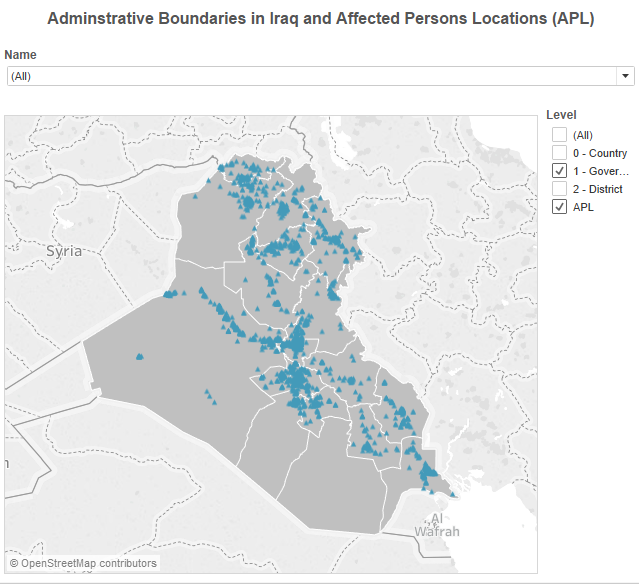Share
By Clara Buelhoff with Helen Campbell
As an Information Management Officer (IMO) for the field support team of the Global WASH Cluster, I see a consistent need for easy-to-use software that can visualize datasets from different sources. Helen and I decided to create guidelines that could help IMOs in the field to combine open data with open source technologies to create interactive maps.
For our initial example, we used Tableau Public and worked with two datasets for Iraq to create our data visualization: IOM data on internally displaced people and the administrative boundaries for the country. The step-by-step process to visualize this data can be found on the HDX Wiki. See the final product below.
Setting up a programmatic process has its pros and cons. On the one hand, it can improve the transformation of the data collected from cluster partners. However, it may be time-consuming when doing the initial setup. We hope that by documenting the entire process, we can save people time in the future.
We will continue to use this Wiki space to add new guidelines. We will begin by adding new steps for integrating other datasets, such as who-is-doing-what-where-when (4W), to the Tableau dashboard. We ultimately hope that the Wiki can be used to co-create a ‘Tableau Public Manual for Humanitarians’.
We welcome your feedback and suggestions for improvements and new features. Help us shape this manual to support your visualization needs! Please send comments to us at hdx@un.org
Displaced families run for shelter during a sandstorm in Debaga IDP Camp in Erbil Governorate, Iraq. © UNICEF/UN025339/Mackenzie/2016
—
About the authors:
Clara Deniz Buelhoff is an Information Management Officer for the Field Support Team of the Global WASH Cluster. In this role, she supports information management for country-based clusters and sectors. Prior to this, Clara was working as an Analyst for ACAPS.
Helen Campbell is an Informatics Consultant and has worked in environmental, climate and humanitarian Informatics. Helen has worked with the UK Environment Agency, the Natural Environment Research Council, MapAction, ACAPS and NetHope. Helen is also an active volunteer with the Digital Humanitarian Network.
